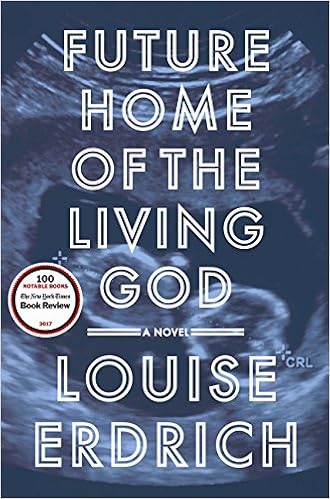When I tell you that my white name is Cedar Hawk Songmaker and that I am the adopted child of Minneapolis liberals, and that when I went looking for my Ojibwe parents and found that I was born Mary Potts I hid the knowledge, maybe you'll understand. [loc. 58]Cedar is 26 years old, Catholic, and four months pregnant. She remembers the last time it snowed, when she was eight. Around her, society -- perhaps civilisation -- is collapsing: Siri's dead, GPS doesn't work, banks are running out of money, domestic animals are no longer breeding true, and the government has sealed the borders and instituted a law of 'gravid female detention', i.e. requiring all pregnant women to give birth under controlled circumstances. There are hints that throwbacks are being born, that evolution is somehow unwinding: there's something like an Archaeopteryx, and a giant sabre-tooth cat devours a Labrador in Cedar's back yard. Fewer healthy babies are carried to term, and some of them seem less human than others.
Cedar is not quite sure if her baby -- due on December 25th -- will be human or not, but she's determined to preserve it from the government and the birthing facilities. An ardent Catholic, she is pleased to find that her birth family share her faith, less pleased to discover that they are horribly ordinary, without any special powers or spiritual connections. At least they don't seem to be harbouring any unpleasant genetics -- but then, all humans carry the genetic heritage of evolutionary failures as well as successes.
Future Home of the Living God -- the slogan on a billboard outside the reservation where Cedar's Ojibwe family run a gas station -- is told in the form of a letter, or diary, that Cedar writes to her unborn child. It describes her experiences while evading the government and the unnerving, all-seeing figure of Mother, and her attempts to find a balance between the white liberal world she grew up in (we don't see much of this) and the Native family she's just coming to know. Her baby's father, Phil, is a peripheral presence, and not a wholly benign one, though Cedar initially recounts the night of conception in magical (or religious) terms.
I found the Potts family likeable and interesting characters, especially the sullen Goth-Lolita half-sister (Mary) and Cedar's birth mother (also Mary). Cedar herself is a compelling, independent and intelligent narrator: but the dystopian setting was unsettling and depressing, and all too credible. The 'pregnancy diary' aspect of the narrative ('you're four inches long and weigh as much as two sticks of butter') was an effective contrast to the disintegration of the wider world: it kept my focus on Cedar's unborn child and what it might represent.
I should note that there are plenty of lighter moments herein: Cedar's arguments with her anti-vax parents, her attempts to buy booze as currency for 'the end of the world', the friction between her and her half-sister. But: the end of the world, or the end of science, or the end of humanity ...
And I think in the end I just didn't like the ending: it felt flat, anticlimactic, despairing.
Louise Erdrich is a member of the Turtle Mountain Band of Chippewa Indians in North Dakota, and has written a number of novels focusing on the tensions between Native American and white culture. I read this novel for the 'book by an indigenous woman writer' rubric of the Reading Women 2019' challenge.

No comments:
Post a Comment